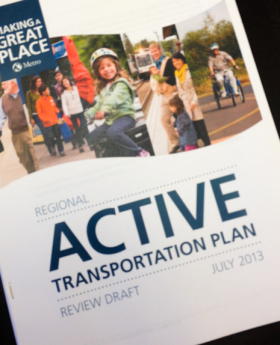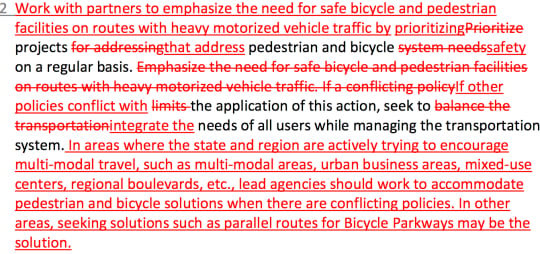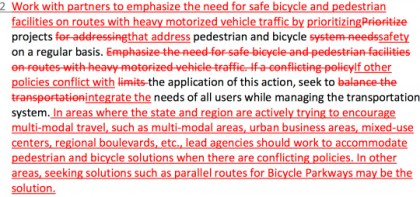
(Photo © J. Maus/BikePortland)
Mayors from 22 of the 25 cities represented by Metro are pushing to make the Regional Active Transportation Plan (ATP) relatively powerless. The plan has been in the making for over two years, and Metro has been showing off the 70-page review draft via public open houses since May.
Lake McTighe, the Metro project manager in charge of the ATP, had planned to have a resolution pass by Metro Council by next month that would have moved the plan to its next step toward implementation. However, a power struggle between Metro and regional mayors became evident last month as they feared the plan would give Metro too much power and would force their hand in implementing new bicycle pathways, walking facilities, and other active transportation projects.
Unlike Portland’s Bicycle Master Plan, which lacks the policy or funding authority it needs to actually build the projects listed in its pages, Metro’s Regional ATP was developed with the intent to have it officially integrated into the all-powerful Regional Transportation Plan (RTP). Projects in the RTP are essentially in a guaranteed pipeline for federal funding as it becomes available. Putting the ATP projects into the RTP would be nothing less than a major milestone for our region’s commitment to active transportation. According to McTighe, the purpose of the ATP is to “help deliver the desired outcomes and vision adopted in the RTP to increase biking and walking, create a safer and more reliable transportation system.”
In other words, the ATP would be a blueprint for cities around the region to create a transportation system that actually lives up to the RTP’s mode share, environmental, and other goals.
But now, the plan is facing a critical juncture as regional mayors have joined members of Metro’s influential Joint Policy Advisory Committee on Transportation (JPACT) in raising concerns about the plan.
The effort to neuter the ATP started in July, as JPACT members began to weigh in on the draft Policy Recommendations and Actions (PDF). At the August 1st JPACT meeting, JPACT Chair Carlotta Collette circulated a document that included edits to the language. According to a source, the JPACT members who were most uncomfortable with ATP’s policy recommendations were Lake Oswego City Councilor Donna Jordan, Washington County Commissioner Roy Rogers, Clackamas County Commissioner Paul Savas, and Beaverton Mayor Denny Doyle.
Their key concern was that the initial language would force cities to implement active transportation projects they didn’t want. JPACT member and the Cornelius Mayor Jeff Dalin stated at the August 1st JPACT meeting that he “still had a lot of concerns” about the ATP. Dalin said he wanted the recommendations and actions in the draft ATP to be “guidelines” instead of “mandates”.
Here’s just one example of how the language was changed:
Metro’s original version:
Prioritize projects for addressing pedestrian and bicycle safety on a regular basis…
After feedback from JPACT members:
Work with partners to emphasize the need for safe bicycle and pedestrian facilities on routes with heavy motorized vehicle traffic by prioritizing projects that address pedestrian and bicycle safety on a regular basis…
And here’s a screenshot from the actual document:

Dalin and others know that if the projects and policies in the ATP are folded into the RTP, cities would lose their power to delay or stop the projects. “Funding scares some of the people I’ve spoke with,” Dalin said at the August 1st JPACT meeting, “If we implement these as requirements, there would be a substantial share of the funding. Make it a recommendation, not a requirement… I think a lot of these decisions are local decisions.”
When Washington County Commissioner Roy Rogers spoke about the edits at JPACT earlier this month, he said, “The new language makes it very clear that this is a recommendation… It gets us to a yes vote… It has calmed the troops a bunch.”
Apparently not enough.
Now it turns out that simply diluting the power of the Regional ATP by weakening its language wasn’t enough. Yesterday, Tualatin Mayor Lou Ogden sent a letter to Metro President Tom Hughes that was co-signed by 21 other regional mayors. The only mayors that didn’t sign the letter were Portland Mayor Charlie Hales, Beaverton Mayor Denny Doyle, Johnson City Mayor Kay Mordock, and West Linn Mayor John Kovash.
The letter laid out a set of concerns including a direct request to “leave matters of implementation to local decision makers,” and “Neither the ATP nor its policies, goals, or guidelines should be tied to federal funding.”
The letter also took a pre-emptive swipe at “road diets”. Under the heading, “Impact on Freight,” Ogden cited a recent poll of Washington County residents that found 72% of respondents disagreed that the county should add narrow roads to add sidewalks and bike lanes.
Ogden called for the resolution to be amended in the following specific ways:
- Delete references to incorporation of the ATP or elements thereof into the RTP
- Limit the “acknowledgement” [resolution] of the ATP only as a “concept plan,” as further outreach with the public is needed before a decision can be made as to whether to incorporate the ATP into the RTP.
Download Ogden’s letter and his proposed resolution here (PDF).
BTA Advocacy Director Gerik Kransky says his organization supports the ATP’s adoption into the RTP. “Our Executive Director, Rob Sadowsky served on the stakeholder committee that helped write the plan and we look forward working on many of its proposals,” he shared today. And via email, Sadowsky seemed to already be looking past the ATP, “While we think regional planning can be an important tool, the reality is that we need to build local support for each specific project. Our work is set out in our Blueprint and we will continue to build support for our priorities. We will work to get the ATP passed but won’t let failure to do so get in the way of advocacy work.”
The outcome of this squabble is very likely to be a major delay in the ATP moving forward. Whether or not it becomes completely powerless — and yet another planning document that sits on a shelf and lacks the political teeth to move the needle away from business as usual and toward a region where bicycle travel is possible for more people — remains to be seen.

